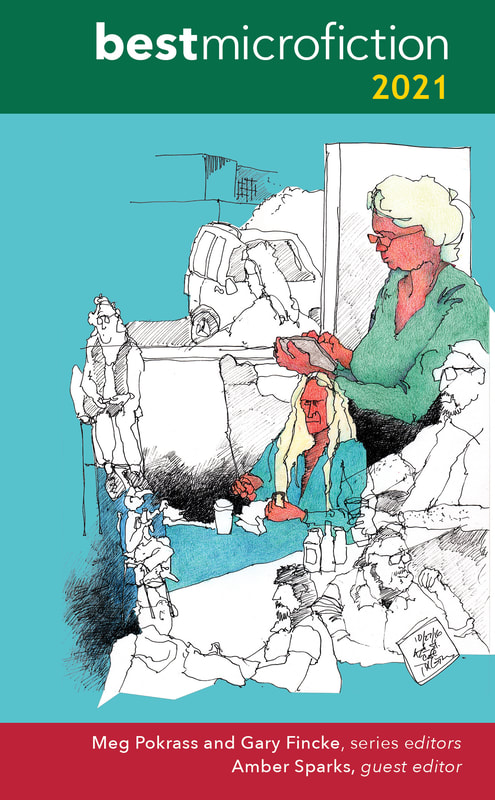|
The Breadcrumbs widget will appear here on the published site.
By Alex Carrigan Last month, I reviewed Spinning to Mars, a collection of microfiction by Meg Pokrass. The collection was a great look into modern microfiction, so I was pleased to follow that up by reviewing another anthology of microfiction that Pokrass had a hand in. Best Microfiction 2021 is the third annual anthology of microfiction from Pelekinesis, collecting dozens of microfiction pieces from dozens of publishers, presses, and websites. Along with co-series editor Gary Fincke and guest editor Amber Sparks, the collection houses work from presses and websites like Okay Donkey Press, perhappened mag, Electric Literature, Flash Fiction Review, Whale Road Review, and more. Reviewing this collection was a bit of a challenge, as gathering nearly 100 stories from across the internet can make it hard to find commonalities or themes throughout the collection. You can't even really say anything is "good" or bad" since every piece was essentially accepted for publication twice. Likewise, with a collection this large, there will ultimately be something for everyone, so it'll be hard to give an opinion based on any perceived "quality" of the work. So while this review may read more like the author listing some of his favorite pieces from the collection, it was still a fascinating challenge to see what connecting threads in those pieces most stood out to the writer of this review. Probably what stood out the most in this collection was how many of the pieces look to examine familial relationships and roles. Several pieces talk about how members of a family communicate and relate to one another. "It's 5 AM-ish, and my father tells me a story from his time in Singapore" by Exodus Oktavia Brownlow (No Contact) conveys a conversation between parent and child during a long drive while K-Ming Chang's "Asymmetry" (Jellyfish Review) describes a person now giving their mother a haircut instead of the other way around. Others look at the legacy and history of their parents, such as in "Not Everything Was in My Father's Will" by Jeff Friedman (New World Writing) which looks at what was left behind by the narrator's deceased father that can't be measured in monetary or physical states. Di Jayawickrema's "Catcus" (Matchbook Literary Magazine) has its narrator and their partner recount the trauma and challenges it took for their relatives to reach the US. There are also several pieces that examine childhood and coming of age. While some like Carson Markland's "Armadillo Jesus" (Smokelong Quarterly) recount specific childhood memories of innocence and faith, others like Charlotte Hughes' "Fairy Tale in Which You Date the Morally Ambiguous Boy in Math" by Charlotte Hughes (Monkeybicycle) speak for themselves about teenage awkwardness and fantasizing around youthful romance. However, there are also several pieces that look at fears that come from parenthood, namely in regards to the potential loss or actual loss of a child. These include pieces like Abigail Oswald's "Autopsy Repot" (takahē magazine) and "Just a Few Facts" by Andrew Stancek (Boston Literary Magazine). Then there's Claire Polders' "Stella Is" (The Mambo Academy of Kitty Wang) which fantasizes what Stella could have been had she not died young. But aside from these thematically similar pieces, Best Microfiction 2021 stands out for the pieces that maybe don't necessarily fit a theme, but are still fantastic works of short fiction. Two stories play with the Alice in Wonderland story in different ways, with Lauren Friedlander's "Alice in Voreland" (Okay Donkey) using the Alice adventure as a metaphor for a different kind of experience, while Cyndi MacMillan's "When Alice Became the Rabbit" (The Ekphrastic Review) examines a different arc "Alice" could have achieved. Others are written more as lists, such as "Places I Have Peed" by Epiphany Ferrell (Miracle Monocle), while others use lists for speculation, like in "Rejected Endings for Titanic" by R.P. Wood (Flash Frontier: An Adventure in Short Fiction). Best Microfiction 2021 is rich with interpretations and content. For work that tries to tell as much as it can in as few words as possible, it's almost too difficult to properly convey the multitude of incredible writing included in the work. The editors and staff behind it should be commended for their careful combing of the internet, and it's likely those who pick this book up will similarly have experiences discovering new work that leaves a succinct impact.
0 Comments
CommentsYour comment will be posted after it is approved.
Leave a Reply. |
AuthorWrite something about yourself. No need to be fancy, just an overview. Archives
March 2024
Categories
All
|



 RSS Feed
RSS Feed






